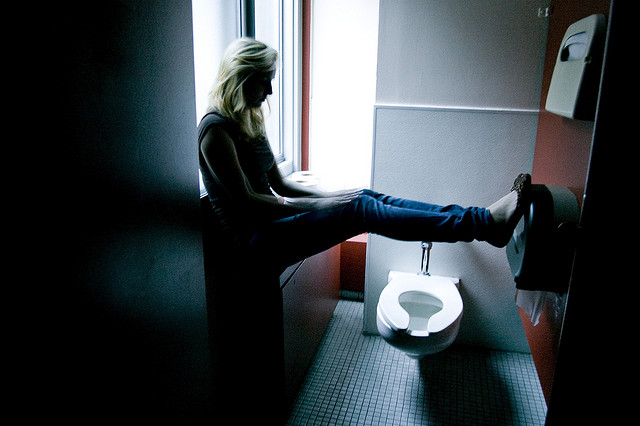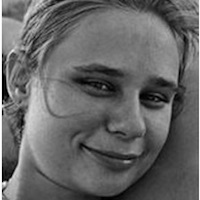I’m the kind of girl who needs to succeed.
Most often, however, when I reach the pinnacle of success, I inevitably fall apart. I leave, give up, or stop what I have been doing and find myself right back at the very beginning.
It begins in the mind. Thoughts appear along the lines of, “This was never going to last. You were lucky. Don’t try any more, you have nothing more to give,” and the loudest of all, “You’re not good enough. Just give up”.
These thoughts, like little missiles, were always aimed with perfect precision at my psyche, and hit exactly where they hurt the most. My mind would shut down, my body would freeze and I would begin the downward spiral of negativity and self loathing.
But recently, something changed. I began questioning these thoughts. Had there been any incidents in the past where I’d done this before? How had they suddenly gotten so dark and dramatic?
I backtracked into the past, picking up incidents and putting them together until they revealed a perfect, tragic, yet liberating pattern which summed everything up in two words: Self Destruction.
I saw how every time something gained speed and grew in my life, I began to systematically destroy it—and myself, in the process.
Habits of self destruction often have their roots in childhood, and if not attended to, wreak havoc on the adults we become. That was certainly true for me, and even after much inner work and journeys taken later in life, the belief that I would never be worthy was a deep one that was—and is—hard to shake, and lies at the very core of all my behaviour.
As a child, I learnt to compensate for my intense lack of self worth with great achievements, but as soon as I reached the top, I would crumble, destroyed my own disbelief that I could sustain it or live up to people’s expectations of me.
These habits continued into school and beyond, in which I would strive to achieve the most I could, get there and inevitably let go and fall. I was a strong climber but had virtually no skills nor support to sustain myself.
And so, I began self medicating at a very early age. I found that it was a perfect solution to an unending problem—in the haze of all of my teenage years through to my young adult years, I learnt how to stop the nasty, disheartening little voices inside my head through various substances. The more I had, the quieter the voices became.
By 16, I had dropped out of school and was a functional addict.
The cycle of seeking, finding and destroying came easily to me.
As a young adult, I found work at low paying, struggling companies and without fail was promoted in each position, given great authority and higher pay. And, without fail, I left, usually before a year had passed by.
This dark habit showed its ugliest face inside my relationships. I went from lover to lover, searching out the most desirable, working hard to “get” them, and then promptly finding myself desperate to destroy the relationship lest they discover the true core of me—shameful, unworthy, bad. Of course, I would always attract those who would leave me, driving me deeper into self abandonment.
Self Destruction is merciless. It is an evil, hidden, and corrosive little habit. It sneaks up when you least expect it—and all too often, when you don’t even notice it, it causes you to ruin relationships, to lose your dreams. It tells you to stay in your safe little corner, that to achieve is to know certain failure. It keeps your spirit small.
And despite my best efforts, my achievements, my talents, the support I had, the love I had, I still kept falling under this same steamroller. Nay, I willingly lay down underneath it, almost begged it to crush me.
Until I received a life changing teaching.
On the long journey to recovery, I was told that all you have to do to change something is to simply bring it into consciousness. By learning how to step back and realise that this is what I do, but not who I am, you liberate yourself. You make a conscious choice to not give in. To choose differently.
Yes, it is easier said than done, but with practice, it started working. I learnt that I could fail, but that did not mean I was a failure.
Going forward, I have applied this mindset to every single area of my life, and have made it my life’s work to help people to do the same.
When we are shrinking in fear, living in doubt, self medicating, running away, it is important to ask ourselves:
1. Have we done this before—run away, quit, hidden, stopped? Why? How? Is this a pattern? Become conscious of it. A pattern is broken once it is recognised.
2. Was there anyone who told us we can’t achieve our dreams , for whatever reason? Thank them for caring for your wellbeing, forgive them, and move on.
3. Are we making excuses for ourselves to stay in our comfort zone or to not grow, achieve more? Do we believe we will become arrogant, should we not stick our heads out too far for fear of failure? Do we believe that to ask for more would be greedy? Really?
4. Are we reacting to a negative emotion such as fear or lack of self worth?
Once we have truly gone inside, we learn that we do have the power within us to break the habits that destroy. By the simple act of conscious awareness, we break the hold these things have on us and build ourselves from the inside out.
As Marianne Williamson said :
“Our deepest fear is not that we are inadequate. Our deepest fear is that we are powerful beyond measure. It is our light, not our darkness that most frightens us. We ask ourselves, ‘Who am I to be brilliant, gorgeous, talented, fabulous?’ Actually, who are you not to be? You are a child of God. Your playing small does not serve the world. There is nothing enlightened about shrinking so that other people won’t feel insecure around you. We are all meant to shine, as children do. We were born to make manifest the glory of God that is within us. It’s not just in some of us; it’s in everyone. And as we let our own light shine, we unconsciously give other people permission to do the same. As we are liberated from our own fear, our presence automatically liberates others.”
~
Author: Margarita Stoffberg
Editor: Emily Bartran
Photo: Mackenzie Greer/Flickr



Read 11 comments and reply